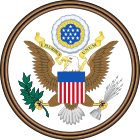Act to protect the commerce of the United States and punish the crime of piracy facts for kids
 |
|
| Other short titles | 1819 James Monroe Piracy Act |
|---|---|
| Long title | An Act to protect the commerce of the United States, and punish the crime of piracy. |
| Acronyms (colloquial) | PSA |
| Nicknames | Piracy Suppression Act of 1819 |
| Enacted by | the 15th United States Congress |
| Effective | March 3, 1819 |
| Citations | |
| Public law | Pub.L. 15-77 |
| Statutes at Large | 3 Stat. 510 |
| Codification | |
| Titles amended | 33 U.S.C.: Navigable Waters |
| U.S.C. sections created | 33 U.S.C. ch. 7 § 381 et seq. |
| Legislative history | |
|
|
| Major amendments | |
|
|
The Piracy Act of 1819 was an important United States law passed to stop piracy on the high seas. It was officially called "An Act to protect the commerce of the United States, and punish the crime of piracy." This law aimed to keep American trade ships safe from pirates.
Later, in 1820, the law was updated. The changes made it clear that taking part in the slave trade (forcing people into slavery) or robbing a ship was also considered piracy. These crimes could lead to the most severe punishment. The last person to be put to death for piracy in the United States under this updated law was Nathaniel Gordon in 1862. He was involved in the slave trade.
Contents
What the Piracy Act Did
The original law, passed in 1819, said that if anyone committed piracy on the open ocean, as defined by international rules, and was later found in the United States, they would face serious consequences. The law stated that such a person could be punished by death. This first version of the act was set to end after the next session of Congress.
Changes Made in 1820
In 1820, the Piracy Act was updated and extended. This new version was sometimes called the "1820 Piracy Law." It made the original act last longer. It also added three new types of actions that would be considered piracy:
- If someone robbed a ship, its crew, or its cargo, it was declared piracy. This crime was punishable by death.
- If someone seized or tricked any person who was not legally enslaved, with the plan to force them into slavery, this was also declared piracy. This crime also carried the punishment of death.
- If someone tried to hold, deliver, or sell a person (who was not legally enslaved) with the goal of making them a slave, this was also considered piracy. This crime too was punishable by death.
Later, in 1823, the law was made "perpetual," meaning it would continue indefinitely and not expire.
Important Trials Under the Act
The Piracy Act of 1819, especially with its 1820 updates, was used in several important court cases. These cases showed how serious the United States was about stopping piracy and the illegal slave trade.
The James Smith Trial (1854)
In November 1854, a man named James Smith, who was the captain of an American ship called the Julia Moulton, was brought to court. He was accused of breaking the Anti-Piracy Act of 1820. The accusation was that he had illegally transported 645 people from Africa to the island of Trinidad to be forced into slavery.
Smith argued that his real name was Julius Schmidt and that he was from Germany, not an American citizen. He claimed he shouldn't be subject to American law. However, he became the first person to be found guilty under the 1820 rules, which meant he could face the most severe punishment.
Later, a new trial was ordered because of some legal issues. Smith was then allowed to admit guilt to a less serious charge. He was sentenced to two years in prison and had to pay a fine of $1000. After serving his time, he asked President James Buchanan for a pardon. President Buchanan granted him a pardon in 1857, which meant he didn't have to pay the fine anymore.
The Nathaniel Gordon Trial (1862)
Nathaniel Gordon was an American who was involved in the slave trade. He was the only person to be tried, found guilty, and put to death for his involvement in the slave trade under this specific law. He was put to death in New York on February 21, 1862.
See Also
- Crimes Act of 1790
- United States v. Jackalow (1862)
- Slave Trade Acts
- Piracy in the Atlantic World
- West Indies anti-piracy operations of the United States

